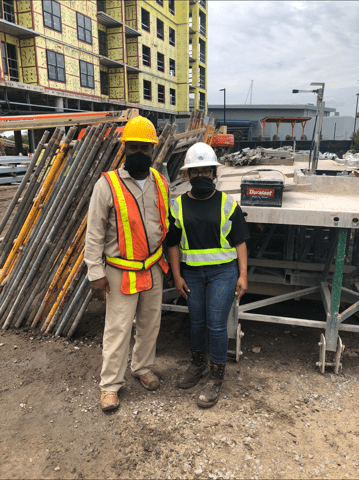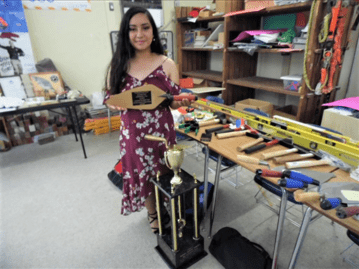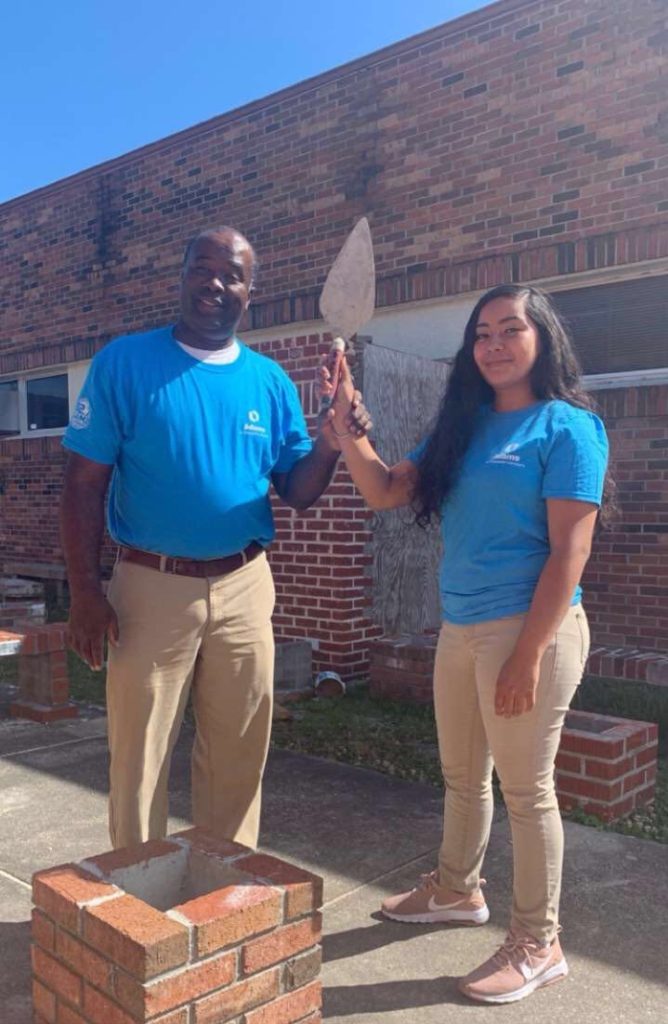Words: MASONRY Magazine
Photos: Maria Torres
Editor’s Note: For the last installation of our GEN NXT series in 2020 we spoke with First Masonry Apprentice Maria Torres. Maria is currently apprenticing with Carolina Masonry Unlimited in Fuquay-Varina, NC. She is also working on completing her Associate’s Degree in construction project management at Cape Fear Community College. We’d like to thank Maria for taking the time to share her story with us, and JagClamp for continuing to sponsor this important series.
MASONRY Magazine: Tell us a little bit about yourself?
Maria Torres: My name is Maria Torres, I’m 20 years old, and I’m from Saratoga, North Carolina. I’m currently enrolled at Cape Fear Community College in Wilmington, NC, and studying construction project management. I’m working in downtown Wilmington, NC at the Pier 33 apartment complex as a mason apprentice, as well as a superintendent assistant.
M.M.: Did you take any masonry courses during high school?
M.T.: Yes, I took masonry classes all four years of high school.
M.M.: Can you tell us about your apprenticeship?

M.T.: I’ve completed one year of the three-year program. It is still a work in progress and it is very different from what I thought it would be. The program is more hands-on, and I’m still learning how to do certain things that I didn’t learn in the classroom. I’m learning that it’s not all about just laying bricks on the wall, it’s more than that. We learn how to do patchwork, punch lists, put in wall ties, and how to cut your birth a certain way. Some other very interesting things we learn are how to make mortar, use different tools like drills and saws, and making sure your rebar sits in the right way. Also, we learn how to make sure you have the correct tie and the correct length of your wall when using block and brick. But it’s also interesting to have other people give you tips on how to do certain things like pointing out brickwork and using different tools.
M.M.: How did you get into the masonry industry?
M.T.: Well, during my four years of high school I took masonry and I was part of a club called SkillsUSA. I did a lot of competitions, and by my senior year of high school, I had competed in around 22-25 competitions within four years. I even won a few. The last competition I was in— H.A. Hardy, that would be my greatest moment doing the line burner and brick project. I am currently the two-time ladies champion and the two-time burner champion. After high school and this competition, I started to get offered jobs, but I still wasn’t sure if that’s what I wanted to do. But the last competition I went to was Sam McGee, and I wasn’t planning on competing in that one. About five minutes before it was about to start they had an open spot, so I just went for it. What could I lose?

After competing in that one, I was offered a job by Bo Black, whom I’m currently working with at Carolina Masonry Unlimited. I’m very thankful that he offered me this opportunity in Wilmington, NC. We wanted to see how things would go, so far there have been good days and bad days, but I’m very grateful for this opportunity. I want to continue in this career because this is just the beginning of something great that I want to accomplish in my life. My ultimate goal is to become a project manager. Currently, I’m in school and getting experience in the field.
M.M.: How did you prepare for the competitions?
M.T.: They will usually give us a project the week before the competition, so to help train we had little practice stations. We would have a practice station for roll-offs or for soldiers, and another station where we built a whole project with CMU and brick. Then we would have mini-sessions where we stayed after school to do a full-three hour project. Every hour we would check to see how far we would progress. After that, we just kept going from there, and any little things that we needed to improve on that’s what we worked on more.

My instructor, Fred Mason, was very helpful but it was also nice to have other students in the class so we could help each other out. Before the week of the competition, they would give us the plans. We would go over the plans and our techniques, but we would also get our tools set to make sure we were ready. We would set it up as if we were in the competition, so we focused on what we needed to get done in our timeframe for each hour, and where we needed to be. We needed to stay focused and consistent. Then, whatever time we had left we could go back and make sure that we got every point possible. In the end, you could be two or three points out of first place, so you always want to go back and check your work so you get every point possible.
M.M.: Do you have any family in the masonry industry?
M.T.: Yes, I do. But they are in Mexico. I went to Mexico last summer and I have two uncles who work in masonry. They were surprised to know that I decided to pursue this career as a female. I saw that the techniques and styles are very different from what I’m used to or what I’ve seen. So that was an interesting experience.
M.M.: What are some of your experiences thus far being a woman in the industry?
M.T.: It’s interesting, you get talked about sometimes in a good way, and sometimes in a not-so-good way. I just have to try to ignore the fact that the negative comments are not important, and I think about the positive. As for being a female in the industry, I have people ask me what I do or what my position is, and when I tell them I’m a first-year mason apprentice some are surprised.
Others have asked me why I’m here or tell me that I need to be in school to better myself. I tell them I am in school, but I am also working to get the experience to help me with school and to see what it is like in the field. Sometimes it bothers me when these comments are made because it makes me feel like I’m not worthy enough to be out there, or that I should be doing something better with my life. But this is what I chose to do and it’s what I want to do.
M.M.: Do you think it is important that there is female representation in the industry?
M.T.: Yes I do. We have that potential to learn, we can be more focused, we think ahead, and we try to plan and improve on what needs to be done. Not everyone is capable of doing what I do. In construction it’s something that you have to grow from, it’s something that you’re determined to learn, it’s not an easy path. From my hands-on experience, it’s not as easy as anybody thinks, but if you have the mindset to do it, go for it.
M.M.: Where do you see yourself in the next five to ten years?
M.T.: I know for sure, I’ll have my Associate’s Degree in Construction Project Management. I’d like to start working a while, and I may want to try to go into teaching masonry. I think that would be interesting to try.
M.M.: What will keep you interested in the masonry industry?

M.T.: The support I get from others always encourages me to keep doing this, to better myself, not to downgrade myself, and not to think about the negative. But to be different. It’s okay to be different. It’s okay to be a woman working in a man’s world. Keep encouraging and influencing others to do the same. Every day I learn something new, which helps me further my experience in the industry.
M.M.: How is it working with the older guys in the industry?
M.T.: It’s very different working with the older guys compared to the guys my age that I’m used to. They have respect for me as a female, they watch out for me, and they don’t try to overstep me. They’ve been very respectful and that’s what I appreciate the most. They try to encourage me and help me as much as possible, with any little tips or advice on brickwork or patchwork. They gave me a heads up on how things should be out there, how I should be treated, and told me not to allow guys to talk down to me. Not to let them step all over me, but to make sure that my voice is out there as well.
M.M.: Can you tell us about some of the challenges you may face in the industry, aside from being a woman in the industry.
M.T.: Well, there have been a few times that I’ve done little projects that I did not think that I was capable of doing. A co-worker and I had to go for it because we didn’t have any other choice, and I ended up doing better than I thought I would.
M.M.: What does your daily routine look like?
M.T.: I wake up every morning at around four o’clock, and I leave around five. I get to the jobsite around seven, it’s about an hour and 20-minute drive for me every day. Once I have all my gear on, I count whatever birth we have on the job, find materials, and do our inventory. Usually, my Superintendent calls me in the morning to let me know what I’m doing for the day and what everybody else is doing, then we’ll get started from there. I go on with my work and they go on theirs, and every so often I check up on them to see what they’re up to. At the end of the day, I walk around the building and see what has been done that day. I make a checklist for my Superintendent so he knows what was completed and what still needs to be worked on.
M.M.: What are some of the projects that you’ve worked on?

M.T.: When I first started working with Carolina Masonry Unlimited, the first project they put me on was Noble Middle School, a theology school. That’s where I did a lot of patchwork, not necessarily laying on the wall. It was kind of aggravating at first because I didn’t know what I was doing. But our foreman on the jobsite helped me with little techniques on the ways I can use my tools to benefit me as I put in walls. There was a bathroom we worked on as well, and they had pipes. I didn’t know how to draw out the pipe with the block. So our foreman showed me the correct way to throw out the block so the pipes fit. After a few times, I eventually figured out how to do it. That was another thing. I also had to set up a bathroom and had to help grout. I also helped with rebar, I drilled four inches to the slab and filled it with rebar.
Then we moved on to our next project, Pier 33, which is an apartment complex in downtown Wilmington, NC. It’s right by the Riverwalk so you can see the ocean, boats and the bridge, the view is really beautiful to look at. The job out there is very interesting because it is really what I’m not used to. They were using three different types of brick and mud, plus stone and block. You have to make sure what color you’re using before you lay it out. But keeping up with that can be a little challenging as well. Out there I also learned how to operate a boom lift. Learning how to drive it, move it up or down, and getting it right where you want it to be was an interesting experience.
M.M.: Is there advice that you would give to someone interested in getting into the masonry industry?
M.T.: It is challenging, and I know from hands-on experience, there are times when you are going to want to quit. In the back of your mind, you know you need to remember the reason why you’re here, where you started out, and where you are now, and that’s an accomplishment of its own. You can’t give up on something that you are interested in, that makes you happy, and motivates you. It is going to be hard, but at the end of the day, the results show you’re capable of doing the job, just like anybody else. Don’t give up on your goals and your dream, no matter how hard it is…you can grow from it.
M.M.: That is really good advice, was there anything else you would like to add?
M.T.: I’d like to thank a few people, honestly. I would like to start by thanking my masonry instructor Fred Mason. If it wasn’t for him, I wouldn’t be here right now, because he is the one who saw potential in me. He saw that I could turn this into a career, not just a hobby, or a side job, but that it can be something more. He encouraged me to compete in the masonry competitions to challenge myself to be different, and to do my best every day. So it was “practice, practice, practice.” He would always say this one quote to me: “If you slow down, you’ll speed up.” That’s something I always keep in mind. I also want to thank my boss, Bo Black, and Carolina Masonry Unlimited for giving me this job opportunity. Fred and Bo said they saw potential in me, and in the strive that I have to do something like this.
I’m very grateful for that, I have learned so much, and I’ve experienced a lot. My superintendent on the jobsite is the one who taught me a lot from when I started. I was so quiet, I wouldn’t talk to anybody, and I was so scared but he taught me to open up and to have a voice. He has taught me a lot about patchwork, gives me advice about the jobsite, how things work, and how things run. It’s not always a piece of cake, but you have to make the best out of it. I’d also like to thank my friends and family who supported me through this.
